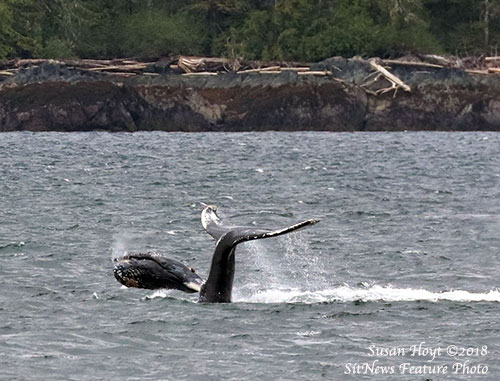



Weekly Specials
Online Shopping; Pickup or Delivery |
|















 Contact Contact 
 Webmail
Letters Webmail
Letters
 News Tips News Tips
 Copyright Info Copyright Info
 Archives Archives
Quick News
Search
 Alaska Alaska
 Ketchikan Ketchikan
 SE Alaska SE Alaska
Columns
- Articles
 Dave Kiffer Dave Kiffer
 Money Matters Money Matters
Historical
Ketchikan
 June Allen June Allen
 Dave
Kiffer Dave
Kiffer
 Louise
B. Harrington Louise
B. Harrington
Sports
 Ketchikan Links Ketchikan Links
Public Records
 FAA Accident Reports FAA Accident Reports
 NTSB
Accident Reports NTSB
Accident Reports
 Court Calendar Court Calendar
 Recent Filings & Case Dispositions Recent Filings & Case Dispositions
 Court Records Search Court Records Search
 Sex Offender Reg. Sex Offender Reg.
 Public Notices Public Notices
 AST Daily Dispatch AST Daily Dispatch
 KTN
Police Reports KTN
Police Reports
 Juneau Police Reports Juneau Police Reports
Weather,
Webcams
 Today's
Forecast Today's
Forecast
 KTN
Weather Data KTN
Weather Data
 AK
Weather Map AK
Weather Map
 AK Weathercams AK Weathercams
 AK Earthquakes AK Earthquakes

|
|

Monday
May 21, 2018

|
Mama Humpback
This mama humpback is teaching her young one the art of tail slapping. A tail slap also known as “lobtailing” is the act of a whale lifting its tail flukes out of the water and forcefully slapping them onto the surface of the water, resulting in a loud slap. According to some scientists, tail-slapping might be a part of its feeding technique and is often coupled with another feeding technique called “bubble-net feeding.”
Front Page Feature Photo By SUSAN HOYT ©2018
|
|
Ketchikan Historical: Effort to retake Attu and Kiska was 75 years ago; Ellis, Bartholomew, other locals, fought in the Aleutians By DAVE KIFFER - Seventy five years ago this month, the only World War II battle on incorporated American territory took place on Attu Island in Alaska's Aleutian Islands.
Japan had the held Attu and neighboring Kiska Island for approximately 11 months and a significant American effort was put in place to drive the Japanese from American "territory" even though the battle was clearly a backwater to the primary American war effort in Asia, Africa and Europe.
When the Japanese invaded Attu and Kiska in June of 1942, there was concern amongst the American and Alaskan public that it was the beginning of a full scale invasion of America. But, in reality, the Japanese never intended for it to be any more than a temporary "diversion" and a long-term defense against American efforts to mount attacks on Japan from the Aleutians.
The original island invasion and the corresponding bombardment of Dutch Harbor was initially an attempt to get the United States to commit valuable war resources to the north and give the Japanese an advantage in their real target, Midway Island, in the central Pacific. But by the time of the attack, the US had broken the Japanese naval code enough to understand that the northern attacks were only a feint.
Still, political and public pressure mounted to evict the Japanese from "American territory" and that led to the lengthy planning process to free Attu and Kiska islands.
Attu had been in Japanese hands for approximately 11 months when the battle to reclaim it began on May 11, 1943. By the time it was over, on May 30, several thousand Japanese and American troops had died over an isolated 344-square-mile rock in the north Pacific that both sides agreed had little or no strategic value.
Initially, when Kiska and Attu were invaded on June 6-7, 1942. US military planners had feared that the Japanese would develop long range bombers that could reach West Coast cities. But by the time a year had passed, it was clear that Japan wasn't close enough to developing such aircraft. The United States, though, was clearly on track with its B-29 program to developing a bomber that could easily reach Japan from bases in the Aleutians.
Dislodging the Japanese Army from the Aleutians took nearly a year of planning and also involved setting up a logistical chain that stretching more than 3,000 miles from Seattle to Adak.
Originally, the American forces had planned to attack first Attu and then Kiska in August of 1943 when the weather was at its best and the fog and frost was less likely to cause logistical problems. But American intelligence uncovered plans the Japanese had to send a relief column consisting of four aircraft carriers, three battleships, seven cruisers and 11 destroyers to the islands to ward off an American invasion, and the timetable was moved up.
Unfortunately, that change in the timetable severely effected the training and preparation of the invading force. Therefore, a significant portion of the Seventh US Infantry Division arrived on site fresh from desert training, unprepared for the cold weather it would encounter in the Aleutians. As a result, weather related casualties dramatically out paced combat related ones for the American soldiers. Frostbite and trench foot effected nearly one third of the US soldiers involved in the effort. - More...
Monday PM - May 21, 2018
|
|
Fish Factor: What happens to fishing families when rules change? By LAINE WELCH - The way that fisheries are managed determines the daily tempo for fishing families’ lives. Managers set the dates and times … the when’s and where’s and who’s … and the amounts that fishermen can catch.
What happens to fishing families when any of the rules change? A new federal study aims to find out.
“Those things are important for fishery managers to consider and try and integrate into their decision making, because there really are universal themes as far as how management changes have affected families,” said Marysia Szymkowiak, a social scientist for NOAA Fisheries based in Juneau.
Over the past year, Szymkowiak has held scoping meetings in communities across Alaska to learn the impacts of fishing changes. The results, she said, will represent a history of how generations of families have adapted with the implementation of limited entry and catch share programs, and now with the decreasing abundance in certain key fisheries.
“We’re getting into the thousands of years in terms of cumulative experiences and knowledge of Alaska’s fisheries,” Szymkowiak said.“It’s a wealth of information that we haven’t tapped into, and I feel so privileged to be able to talk with people who share heartfelt stories about families and the things that are built from that experience.”
The project emerged from a 20 year review Szymkowiak co-authored about impacts of the halibut and sablefish fisheries that in 1995 switched from being open to all to an Individual Fishing Quota (IFQ)system that gave shares of the catch to fishermen based on their historical participation.
“One of the things we heard was the different impacts on women who participated prior to IFQs,” Szymkowiak said. “One said the new program made the halibut season too long and she could no longer participate because it conflicted with her responsibilities as a mom.”
Limited access to fisheries is a main theme voiced in scoping meetings, combined with environmental concerns affecting the stocks.
“For some families there is less of a buffer when a stock declines in terms of their ability to diversify within fisheries,” Szymkowiak said. “This can really lead to stress within families, having to seek other employment, and can really change the social fabric of fishing communities.”
Another theme, she said, is a strong sense of resilience and values that go beyond the economics of going fishing.
“In terms of shaping young people and creating a work ethic and a sense of place and community. There is a cross generational participation in fisheries that is really unique,” she added.
A final Fishing Families scoping meeting is set for Kodiak on June 4, after which Szymkowiak will begin compiling a report on the findings. - More...
Monday PM - May 21, 2018
|
|
Alaska Science: Making a new map of Denali By NED ROZELL - A Fairbanks scientist recently made an intricate new map of Denali while crisscrossing its summit a few times in a single-engine airplane. His top-of-the-continent measurement was within a few feet of a GPS reading done a few years ago, using a system he calls fodar.
Matt Nolan is a former University of Alaska Fairbanks faculty member who is now in the business of precision mapping using his three aircraft equipped with fodar, a term he invented. It means “any photogrammetric process for quantitatively measuring both the color and elevation of Earth’s surface using a small-format digital camera.”
In previous glacier studies, Nolan had been frustrated with the expense of lidar systems, which pilots carry over landscapes, bouncing laser pulses to the surface and back to determine elevations. He combined a digital camera with a GPS system while flying and refined it until it worked.
On April 8, 2018, he, fellow pilot Kristin Scott and their 12-year-old son Turner took off from Fairbanks on a nice spring day with calm winds.
They flew 150 miles southwest to Denali, the highest mountain in America. After flying over the summit several times and crunching the data, Nolan measured the height of Denali’s south peak as 20,308.6 feet.
A GPS point measurement of Denali’s summit height by climbers, including UAF’s Tom Heinrichs in 2015, was 20,310 feet, with an accuracy of plus or minus one inch. That number, embraced by U.S. Geological Survey officials, pushed out the old USGS map measurement of 20,320 that was the standard for decades. The 2015 expedition team also determined Denali’s high point was on top of at least 13 feet of wind-packed snow that coated the ice or rock underneath.
The difference between Nolan’s and the 2015 reading is something he expected, due to changes to the snow cornice covering the bedrock, which “could easily exceed a meter elevation in a single storm,” Nolan said.
Nolan said the accuracy of his system allowed him to map the entire top of the mountain down to individual snow drifts, to within 6 inches accuracy. The next-best map is accurate to about 50 feet, he said. - More...
Monday PM - May 21, 2018
|
Analysis: Improving school climate, not just security, is key to violence prevention By F. CHRIS CURRAN - School shootings like the one that took place in Santa Fe, Texas, on May 18 are often followed by calls for enhanced security measures.
But Santa Fe High School already had many of these security measures in place.
For instance, the high school had a school resource officer who responded to the attack. The school also had security cameras in place and had recently conducted active shooting training and drills.
As the nation searches for ways to prevent school violence, the focus must be as much on school climate and culture as it is on school security. I make this argument as an educational researcher who studies school safety.
Calls for beefed up security
Many of the security measures in place at Santa Fe High School were called for in the wake of the Feb. 14 school shooting in Parkland, Florida. For instance, several states have passed legislation to increase law enforcement presence at schools. The federal government expanded funding to support the use of security measures such as metal detectors as well as training for threat identification and emergency response.
Beyond the school walls, there have been broader calls for gun control. It is notable that the weapons used in the attack are reported to have been owned legally by the father of the shooter and were not the type targeted by most gun control proposals.
One area that often gets overlooked in the aftermath of these tragedies is school culture. News reports indicate the shooter was reportedly bullied by other students and coaching staff. School officials, however, dispute this account.
An examination of the school culture at Santa Fe High School could prove as important as a review of the school security measures that were in place and the extent to which they were followed.
Why school climate matters
Research has consistently shown that positive school climate is a strong predictor of school safety. When students have healthy peer relationships, teachers they trust, and school policies that they perceive as fair, they are more likely to feel safe in the school and less likely to misbehave. - More...
Monday PM - May 21, 2018
|

Political Cartoon: Thoughts on Prayers
By
Steve Sack ©2018, The Minneapolis Star-Tribune, MN
Distributed to paid subscribers for publication by Cagle Cartoons, Inc.
Open Letter RE Community Grants: KGB Mayor Landis By Glen Thompson - Dear Mayor Landis, At the Regular Assembly Meeting of May 7, 2018, the Ketchikan Gateway Borough Assembly (“Assembly”) introduced Ordinance 1859, adopting the FY2019 Borough Budget, and set that ordinance for public hearing at the Regular Assembly Meeting of May 21, 2018.
Draft Ordinance 1859, as presented to the Assembly for introduction, included $139,740 in community grant appropriations out of the General Fund to eleven non-profit entities that can be classified as Social Service agencies. Merriam-Webster defines Social Service as:
“An activity designed to promote social well-being; specifically: organized philanthropic assistance (such as counseling, job training, or financial support)”
When the Assembly officially introduced Ordinance 1859, it also increased the community grant appropriations for those Social Service agencies by $19,441 to a total of $159,181; a nearly 14% increase. The agencies and their community grant appropriations in Ordinance 1859 as introduced are listed below: - More...
Friday PM - May 18, 2018
2020 GO TO HELL, DOT By David G Hanger - While Juneau gets pristine roads without a pothole anywhere, Ketchikan gets a damned dog and pony show put on by DOT that includes toy trucks and hard hats for the kids. Plus the announcement that no improvements will be made to that hole in the road between the Coast Guard base and Saxman for at least three years. How much of this is racist????!!! Saxman is, of course, an Indian community.
In the meantime there are two sets of memorial wreaths, etc. set out to honor those who have been killed on that stretch of road in the past two or three years, which definitely makes this the most dangerous stretch of road on this rock.
So the solution that DOT provides us is a bunch of overfed duds eating pizza at a dog and pony show. Fire this bunch of worthless overfed bureaucrats. It is clearly pointless to employ them. They are more useless than lipstick on a pig.
Part of the problem here is the State does not want to use state funds to pay for this fix. They want a massive improvement project paid for with Federal funds, but no Federal funds are available, and this is otherwise an excuse for a bunch of planners to siphon the public purse for five years or longer; all for specs for a piece of road less than a mile long. This project is likely to be deferred for the next ten years the way things are going now.
What is clear is Ketchikan does not exist as a priority for DOT in any way, shape, form, or fashion. They can’t fix the dam potholes, and they won’t fix the road. So taking a paycheck from the government is just a form of dishonesty and corruption on their part. They cannot and will not deliver the goods, so this is the place to start with state government cost-cutting. Fire all useless duds, and if you are sitting around in a government office right now, you are a dud. There is a lot of field work that is being totally ignored. - More...
Friday AM - May 18, 2018
The Mysterious Jim Duncan By Tom Crosier - I worked with Jim Duncan's son, Rick on the F/V Margaret Ann, catching Dungeness crab in the areas around Bell Island. We sent 1500 pounds of live crab a week to Seattle by Alaska Airline. - More...
Friday AM - May 18, 2018
HB 312 strips away your rights By Andree McLeod - Lawmakers have again willfully and intentionally stripped away constitutionally protected rights of due process. House Bill 312 is, in part, an Act relating to arrest without a warrant for assault in the fourth degree at a health care facility. It impacts everyone, especially people who live with brain illness and cognitive impairments, such as autism, Post-Traumatic Stress Disorder, dementia, Alzheimer's disease, Traumatic Brain Injury, and mental illness, among other brain illness.
In their attempt to deal with an increased crime rate, lawmakers found the courage to strip away the rights of individuals who are at their most vulnerable, when they're brought to medical facilities experiencing confusion and severe bouts of psychosis, mania, disorientation, and other symptoms of brain and cognitive impairments unrelated to substance abuse.
The sponsors of HB 312, Reps Matt Claman and Chuck Kopp, drafted and defended their egregious bill with talking points that showed they lacked an understanding of the nature of brain illness. This could have easily been remedied by first getting input from experts at state and nationally-based organizations who serve and advocate for folks who live with brain illness and cognitive impairments in order to give them a clearer understanding.
They further failed to present substantiated data that showed who commits these assaults (co-workers, patients, family members, others?) and failed to explain the root causes of these assaults. - More...
Friday PM - May 11, 2018
 Webmail your letter or Webmail your letter or
 Email Your Letter To: editor@sitnews.us Email Your Letter To: editor@sitnews.us
|
Articles &
photographs that appear in SitNews may be protected by copyright
and may not be reprinted or redistributed without written permission
from and payment of required fees to the proper sources.
E-mail your news &
photos to editor@sitnews.us
Photographers choosing to submit photographs for publication to SitNews are in doing so, granting their permission for publication and for archiving. SitNews does not sell photographs. All requests for purchasing a photograph will be emailed to the photographer.
|
|
















The Local Paper is
available online.
Click here for this week's printed edition (PDF)

|
|

![]() Contact
Contact ![]()
![]() Webmail
Letters
Webmail
Letters![]()
![]() News Tips
News Tips![]()
![]() Copyright Info
Copyright Info![]() Archives
Archives![]() Alaska
Alaska![]() Ketchikan
Ketchikan![]() SE Alaska
SE Alaska![]() Dave Kiffer
Dave Kiffer![]() Money Matters
Money Matters ![]() June Allen
June Allen![]() Dave
Kiffer
Dave
Kiffer![]() Louise
B. Harrington
Louise
B. Harrington ![]() Ketchikan Links
Ketchikan Links![]() FAA Accident Reports
FAA Accident Reports ![]() NTSB
Accident Reports
NTSB
Accident Reports![]() Court Calendar
Court Calendar![]() Recent Filings & Case Dispositions
Recent Filings & Case Dispositions ![]() Court Records Search
Court Records Search![]() Sex Offender Reg.
Sex Offender Reg.![]() Public Notices
Public Notices![]() AST Daily Dispatch
AST Daily Dispatch![]() KTN
Police Reports
KTN
Police Reports![]() Juneau Police Reports
Juneau Police Reports ![]() Today's
Forecast
Today's
Forecast![]() KTN
Weather Data
KTN
Weather Data![]() AK
Weather Map
AK
Weather Map![]() AK Weathercams
AK Weathercams![]() AK Earthquakes
AK Earthquakes






































